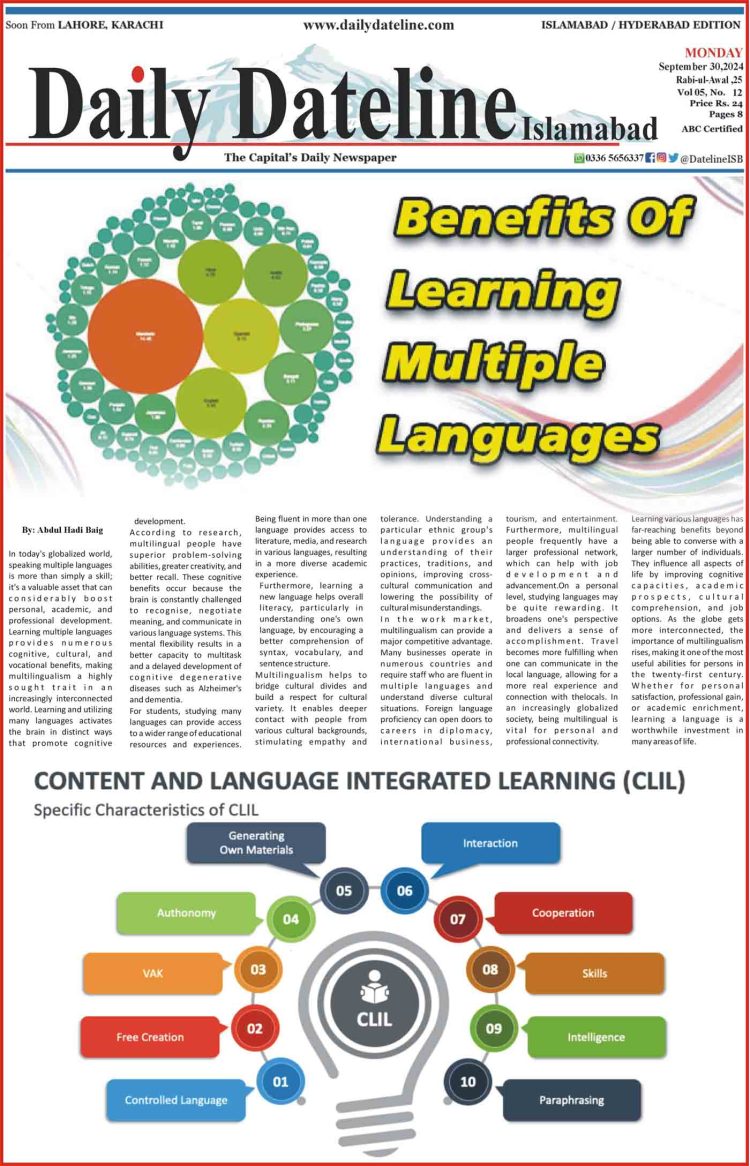By: Abdul Hadi Baig
In today’s globalized world, speaking multiple languages is more than simply a skill; it’s a valuable asset that can considerably boost personal, academic, and professional development. Learning multiple languages provides numerous cognitive, cultural, and vocational benefits, making multilingualism a highly sought trait in an increasingly interconnected world. Learning and utilizing many languages activates the brain in distinct ways that promote cognitive development.
According to research, multilingual people have superior problem-solving abilities, greater creativity, and better recall. These cognitive benefits occur because the brain is constantly challenged to recognise, negotiate meaning, and communicate in various language systems. This mental flexibility results in a better capacity to multitask and a delayed development of cognitive degenerative diseases such as Alzheimer’s and dementia.
For students, studying many languages can provide access to a wider range of educational resources and experiences. Being fluent in more than one language provides access to literature, media, and research in various languages, resulting in a more diverse academic experience.
Furthermore, learning a new language helps overall literacy, particularly in understanding one’s own language, by encouraging a better comprehension of syntax, vocabulary, and sentence structure.
Multilingualism helps to bridge cultural divides and build a respect for cultural variety. It enables deeper contact with people from various cultural backgrounds, stimulating empathy and tolerance. Understanding a particular ethnic group’s language provides an understanding of their practices, traditions, and opinions, improving cross-cultural communication and lowering the possibility of cultural misunderstandings.
In the work market, multilingualism can provide a major competitive advantage. Many businesses operate in numerous countries and require staff who are fluent in multiple languages and understand diverse cultural situations. Foreign language proficiency can open doors to careers in diplomacy, international business, tourism, and entertainment. Furthermore, multilingual people frequently have a larger professional network, which can help with job development and advancement.
On a personal level, studying languages may be quite rewarding. It broadens one’s perspective and delivers a sense of accomplishment. Travel becomes more fulfilling when one can communicate in the local language, allowing for a more real experience and connection with the
locals. In an increasingly globalized society, being multilingual is vital for personal and professional connectivity.
Learning various languages has far-reaching benefits beyond being able to converse with a larger number of individuals. They influence all aspects of life by improving cognitive capacities, academic prospects, cultural comprehension, and job options. As the globe gets more interconnected, the importance of multilingualism rises, making it one of the most useful abilities for persons in the twenty-first century. Whether for personal satisfaction, professional gain, or academic enrichment, learning a language is a worthwhile investment in many areas of life.

















